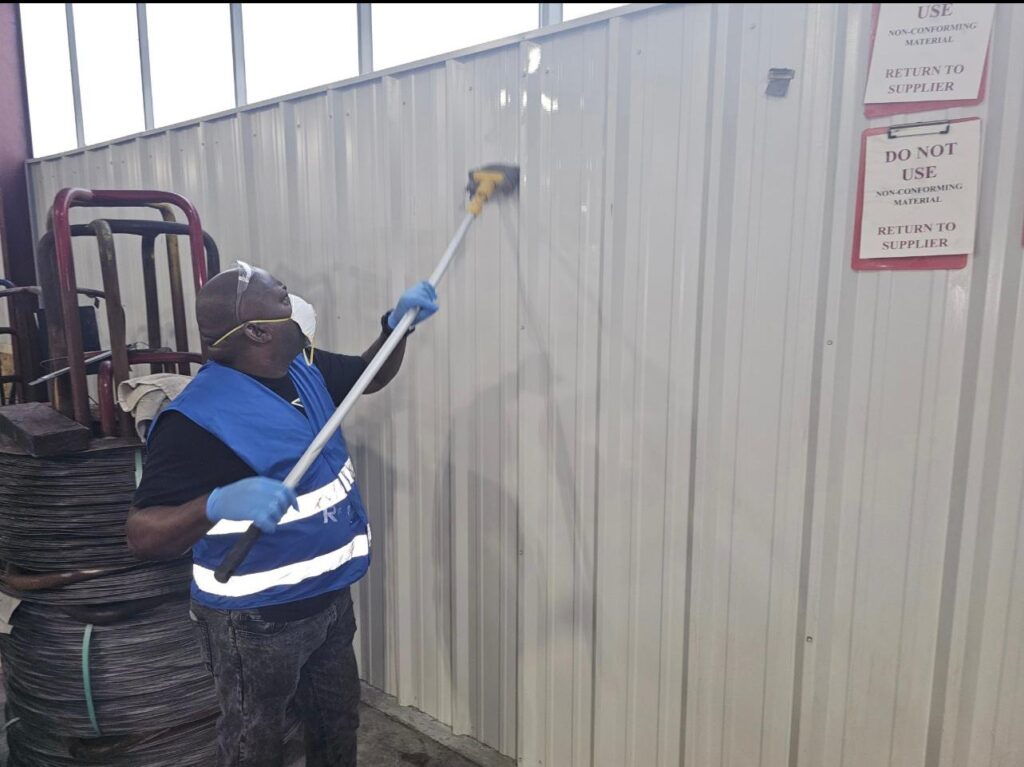Are you dealing with a mold problem in your rental property? It can be frustrating to discover mold growing in your home, but determining responsibility for mold removal can be equally challenging. In this article, we will help you navigate the murky waters of landlord-tenant mold responsibility.
When it comes to mold removal, the issue of responsibility often depends on several factors. These factors can include the terms of your lease agreement, the cause of the mold growth, and local laws and regulations.
Understanding your rights and responsibilities is essential for both tenants and landlords. By knowing who is responsible for mold removal, you can effectively address the issue and ensure a safe and healthy living environment.
Join us as we explore the intricacies of mold removal responsibility in rental properties. Whether you’re a tenant seeking compensation or a landlord facing a mold complaint, this article will provide you with the insights you need. Let’s dive in and shed light on the question: “Who’s Responsible for Mold Removal: Landlord or Tenant?”
Understanding the responsibilities of landlords and tenants
When it comes to mold removal, it’s crucial to understand the distinct responsibilities of both landlords and tenants. Generally, landlords are responsible for maintaining the property and ensuring that it is safe and habitable. On the other hand, tenants are responsible for keeping the property clean and reporting any issues to the landlord promptly.
While the responsibilities may seem straightforward, mold can blur the lines of responsibility. Mold growth is often a result of moisture problems within the property, which can be caused by various factors such as leaky pipes, inadequate ventilation, or water intrusion from the outside.
So, who should be held responsible when mold becomes an issue? Let’s delve deeper into the specific responsibilities of landlords and tenants regarding mold removal.
Landlord responsibilities for mold removal
As mentioned earlier, landlords have a duty to provide a safe and habitable living environment for their tenants. This duty extends to addressing mold problems in the rental property. Landlords should:
- Regularly inspect the property: Landlords should conduct routine inspections to identify any signs of mold growth. Early detection can help prevent the spread of mold and minimize potential health risks for tenants.
- Address the underlying cause: If mold is discovered, it’s crucial for landlords to address the underlying cause of the mold growth. This may involve repairing leaky pipes, improving ventilation, or addressing any other issues that contribute to moisture problems.
- Arrange for professional mold removal: In cases where the mold problem is extensive or poses a health risk, landlords should arrange for professional mold removal. Professional mold remediation companies have the expertise and equipment to safely and effectively remove mold from the property.
Tenant responsibilities for mold prevention
While landlords have primary responsibility for mold removal, tenants also have a role to play in preventing mold growth. As a tenant, you should:
- Keep the property clean and well-maintained: Regularly clean and maintain your rental property to prevent mold growth. This includes promptly addressing any spills or leaks and ensuring proper ventilation in bathrooms and kitchens.
- Report any signs of mold promptly: If you notice any signs of mold, such as a musty smell or visible growth, report it to your landlord immediately. Prompt reporting can help prevent further damage and ensure that the issue is addressed in a timely manner.
- Take preventive measures: Take proactive steps to prevent mold growth, such as using exhaust fans during showers, opening windows to improve ventilation, and using dehumidifiers in areas prone to moisture.
By understanding and fulfilling your responsibilities as a tenant, you can contribute to maintaining a mold-free environment in your rental property.
When to involve a professional mold removal company
While some minor instances of mold can be managed by landlords or tenants, there are situations where involving a professional mold removal company is necessary. Here are some instances where professional intervention may be required:
1. Extensive mold growth: If the mold growth covers a large area or has spread to multiple rooms, it is advisable to seek professional help. Professional mold remediation companies have the expertise and equipment to handle large-scale mold infestations effectively.
2. Toxic or black mold: Certain types of mold, such as toxic or black mold, can pose significant health risks. If you suspect the presence of these molds, it is crucial to engage professionals who are trained in handling toxic mold safely.
3. Recurring mold problems: If you have had recurring mold issues despite efforts to address the underlying cause, it may be necessary to involve professionals to identify and resolve the root cause of the problem.
In these situations, professional mold removal companies can provide the necessary expertise and ensure that the mold problem is effectively addressed, minimizing health risks and preventing further damage to the property.
Steps to take if you discover mold in your rental property
Discovering mold in your rental property can be alarming, but it’s important to take immediate action to address the issue. Here are the steps you should take if you find mold:
- Document the mold: Take photographs or videos of the mold growth as evidence. This documentation will be useful if you need to involve your landlord or seek legal assistance.
- Report the mold to your landlord: Notify your landlord about the mold problem as soon as possible. Provide them with the documentation you have collected and request prompt remediation.
- Follow up in writing: If your landlord fails to address the mold problem, follow up with a written request for remediation. Keep a copy of this correspondence for your records.
- Seek legal advice if necessary: If your landlord refuses to address the mold issue or if the problem persists, you may need to seek legal advice. A lawyer specializing in landlord-tenant disputes can help you understand your rights and guide you through the legal process if necessary.
Legal considerations for landlords and tenants regarding mold
When it comes to mold in rental properties, legal considerations play a crucial role in determining responsibility. The specific laws and regulations governing mold vary from jurisdiction to jurisdiction, so it’s important to familiarize yourself with the laws in your area. Here are some general legal considerations for landlords and tenants:
- Implied warranty of habitability: Many jurisdictions have an implied warranty of habitability, which requires landlords to maintain rental properties in a safe and livable condition. Mold growth that affects the habitability of the property may constitute a breach of this warranty.
- Lease agreements: The terms of your lease agreement may outline specific responsibilities for both landlords and tenants regarding mold. It’s important to review your lease agreement to understand your rights and obligations.
- Local health and housing codes: Local health and housing codes may have specific requirements for mold prevention and remediation. Familiarize yourself with these codes to ensure compliance.
Consulting with a local attorney who specializes in landlord-tenant law will provide you with the most accurate and up-to-date information regarding your rights and obligations related to mold in rental properties.
Common misconceptions about mold and responsibility
When it comes to mold in rental properties, there are several common misconceptions that can complicate the issue of responsibility. Let’s debunk some of these misconceptions:
- Mold is always the tenant’s fault: While tenants have a responsibility to maintain cleanliness and report issues promptly, mold growth can occur due to underlying property issues that are beyond the tenant’s control.
- Landlords are always responsible for mold removal: While landlords have a duty to maintain the property, there are instances where tenants may be responsible for mold removal, such as when the mold growth is a result of tenant negligence.
- Insurance will cover all mold-related costs: Insurance coverage for mold varies depending on the policy and the circumstances. It’s important to review your insurance policy and understand the extent of coverage for mold-related issues.
By understanding these misconceptions, both landlords and tenants can approach mold issues with clarity and make informed decisions regarding responsibility and remediation.
Tips for preventing mold growth in rental properties
Prevention is always better than remediation when it comes to mold. Here are some tips to help prevent mold growth in rental properties:
- Control moisture: Address any sources of moisture promptly, such as leaks or condensation. Keep humidity levels below 50% by using dehumidifiers if necessary.
- Promote ventilation: Ensure proper ventilation in areas prone to moisture, such as bathrooms, kitchens, and basements. Use exhaust fans or open windows to improve airflow.
- Regular cleaning: Regularly clean and dry areas prone to moisture, such as bathrooms and kitchens. Remove any visible mold promptly and clean affected surfaces with an appropriate mold cleaner.
- Inspect and maintain: Conduct regular inspections of the property to identify any signs of mold or moisture problems. Address any issues promptly to prevent mold growth.
By following these preventive measures, both landlords and tenants can minimize the risk of mold growth and maintain a healthy living environment in rental properties.
Conclusion: Promoting a healthy living environment
In the realm of mold removal, the question of responsibility between landlords and tenants can be complex. While landlords have a primary duty to address mold issues, tenants also have responsibilities in preventing mold growth and reporting problems promptly.
Understanding the legal considerations, debunking common misconceptions, and following preventive measures can help both parties navigate the murky waters of mold responsibility. Ultimately, the goal is to promote a healthy living environment for tenants and ensure that mold issues are addressed effectively and efficiently.
By working together and understanding each other’s roles, landlords and tenants can create a harmonious living environment while tackling mold problems head-on. Remember, communication and proactive action are key to resolving mold issues and maintaining a safe and habitable rental property.





No comment yet, add your voice below!